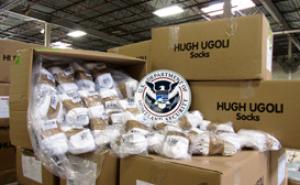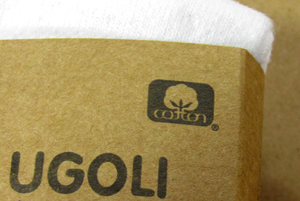US CBP Officers Seize nearly $2 Million in Counterfeit Diabetic Socks Destined to Loudoun County, VA
U.S. Customs and Border Protection officers at the Area Port of Norfolk-Newport News, Va., certainly do not suffer from cold feet when it comes to enforcing intellectual property rights laws, especially not after they just seized nearly 120,000 pairs of counterfeit cotton foot coverings on Wednesday. The diabetic socks would have had a manufacturer’s suggested retail price of $1,897,056 if they were authentic.

The shipment, which initially arrived in a shipping container from Turkey on June 17 and was destined to an address in Loudoun County, Va., consisted of 579 boxes containing a combined 118,566 pairs of Hugh Ugoli branded diabetic cotton socks.
CBP officers inspected the shipment on June 20 and detained the socks on June 21 to verify the authenticity of trademarks on the packaging. CBP protects trademarks through its e-Recordation Program, where intellectual property rights owners can register their trademarks.
CBP officers then requested documentation from the import broker authorizing the Loudoun County consignee to import the socks.
CBP officers also submitted photographs and documentation of this shipment to CBP’s Apparel, Footwear and Textiles Centers of Excellence and Expertise, which are the agency’s trade experts, for a final authenticity determination and an appraisal.
On Tuesday, CBP’s trade experts reported that the entire shipment of 118,566 pairs of diabetic socks were counterfeit for violating the “Seal of Cotton” trademark.

Consumer goods bearing the Seal of Cotton trademark are certified to be manufactured according to stringent international manufacturing and safety standards.
Officers seized the counterfeit diabetic socks on Wednesday. No one has been criminally charged. An investigation continues.
“The sheer volume of this counterfeit diabetic sock shipment is alarming. Any level of substandard manufacturing, especially of these specialty socks, seriously endangers the health and well-being of our most vulnerable citizens who rely on them for comfort and blood circulation,” said Mark Laria, CBP’s Area Port Director for the Area Port of Norfolk-Newport News. “Customs and Border Protection remains committed to intercepting counterfeit and potentially dangerous consumer goods, and we strongly encourage consumers to protect themselves and their families by purchasing goods only from reputable vendors.”
The international trade in counterfeit consumer goods is illegal. It steals revenues from trademark holders, steals tax revenues from the government, funds transnational criminal organizations, and the unregulated products potentially threaten the health and safety of American consumers. Counterfeit consumer goods may also be sourced or manufactured in facilities that employ forced labor.
CBP protects businesses and consumers every day through an aggressive Intellectual Property Rights (IPR) enforcement program. During fiscal year 2021, CBP officers and Homeland Security Investigations (HSI) special agents seized over 27,000 shipments containing goods that violated intellectual property rights. The total estimated manufacturer’s suggested retail price (MSRP) of the seized goods, had they been genuine, was $3.3 billion, or an average of about $9 million every day.




